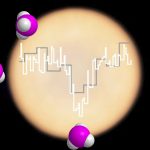On September 14th Nature Astronomy published a paper by Prof. Jane Greaves and her collaborators, including me, on the tentative discovery of phosphine in the atmosphere of Venus.
This is huge news. Phosphine is a colourless, highly poisonous gas found in tiny amounts (parts per trillion) in Earth’s atmosphere. It is a gas that our MIT group has been interested in for some time. It is a robust sign of life, as it cannot be made by any geological process: if phosphine is there, it is made by life. On Earth, anyway. See Here for the Greaves et al discovery paper.

So – phosphine on Venus?
We have spent the last two years trying to work out how a non-living process could produce phosphine in Venus’ acid, oxygen-rich atmosphere. We calculated the rate at which it might be produced by reaction of atmospheric gases with each other, with sulfur haze, with cloud droplets, with surface rocks. We worked out if volcanoes or lightning or earthquakes or meteorites could account for what Jane saw. We drew a complete blank. This paper lists everything we have explored: it is over 20,000 words long, but the title says it all really: “Phosphine on Venus Cannot Be Explained by Conventional Processes”.
But life also seems impossible. Life on the surface is ruled out because at surface temperatures – over 400oC – any organic chemicals are reduced to char. The clouds are cooler, but they are made of sulfuric acid, which destroys nearly every component of life as we know it. Any life on Venus must be radically different from life on Earth, and I do not mean “has pointed ears and green blood” different. I mean does not use protein. Or DNA. Or maybe even water; Venus is 50x drier than the driest places on Earth, and all life that we know of needs water.
This is spectacularly exciting because, as Isaac Asimov (probably) said, “The most exciting phrase to hear in science is not “Eureka” but “That’s odd…”. Something inexplicable, strange, can lead to momentous discoveries. Personally I still think the chance of life on Venus is small. I think the chance of life anywhere is small. But – wow! If that is life, if our nearest neighbour in the Universe, a planet completely unlike ours, hosts living organisms, that would be beyond amazing. The tiniest chance that there is life there is something that we have to follow it up, to go there and find out.